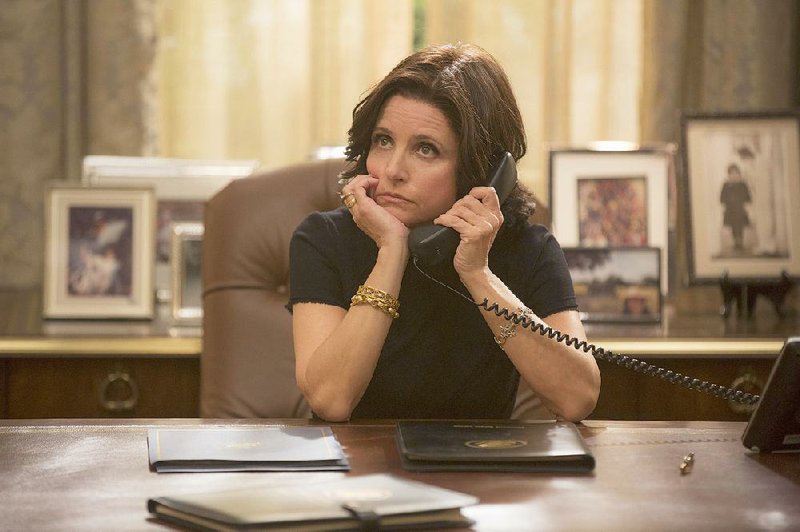The good folks at the Project for the Study of the 21st Century and the Delegation of the European Union to the United States were kind enough to invite me, along with delegation spokesman James Barbour, State Department veteran Ari Ratner and Washington Post Outlook Editor Adam Kushner, to speak recently on what television can teach us about politics.
We spent time, of course, on big dramas such as Scandal, Game of Thrones and House of Cards, but the conversation took an intriguing turn when we ventured onto the subject of comedy, and specifically the reason that British political humor and satire is so much darker and more biting than its American equivalent.
Most of the American shows we discussed during the panel, from The West Wing to House of Cards, are dramas, in part because, with exceptions like Parks and Recreation, recent American television just hasn't produced very many comedies about politics. Whether they're inspirational dramas like Commander in Chief and The West Wing, melodramas like Scandal and House of Cards, or security-driven dramas like 24, American television tends to take politics very seriously.
One possible explanation I floated to Barbour, who is Scottish, is the possibility that British satirists and comedians are just more confident in their form of government than Americans are in ours. The American experiment in democracy is less than 250 years old, and we're still trying to finish the work of the cataclysm that tore the country apart.
Magna Carta, by contrast, celebrated its 800th birthday this June, and the English Civil War, though longer than the American one, ended in 1652. Maybe with time -- and the experience of the decline of the British Empire and the realization that the world didn't end with it -- comes faith that the system will survive, for good or ill, and can stand up to some truly savage ribbing. And maybe Americans' grand claims to exceptionalism, goodness and moral authority, combined with insecurity that those claims might not be true, run the risk of gentling television's take on American government.
I do think it's true that in recent years, American television has become a bit more scabrous about government and politicians, though in the most notable case, with significant help from a Brit.
Veep, the closest pop culture has come in recent years to a British-style skewering of American political rituals and the people who submit themselves, came to HBO from Armando Iannucci, who sharpened his swords on British institutions with his show The Thick of It, and the movie extension of the show, In the Loop. (Iannucci has since moved on from the series.)
In Veep, Selina Meyer (Julia Louis-Dreyfus), the vice president and then president, is vain, impatient and talented but also deeply cynical about her work as a politician. Her most talented and principled aide, Amy (Anna Chlumsky), is constantly grinding herself down for Selina in a way that renders her potentially less effective in the future, while her hollower counterpart and ex, Dan (Reid Scott), rises, at least for a time. The closest Veep gets to optimism is to suggest that Washington will chew up the sincere and the careerist in precisely the same ways.
The fully American product that has a sensibility most in common with that of Veep is Garry Trudeau's Alpha House, his Amazon series based loosely on the real Capitol Hill house where a group of Washington lawmakers lived for a decade. Trudeau has spent decades writing and penciling the comic strip Doonesbury, and his experience shows in a willingness to treat his characters, Republican senators Gil John Biggs (John Goodman), Robert Bettencourt (Clark Johnson), Louis Laffer (Matt Malloy) and Andy Guzman (Mark Consuelos), as ridiculous while maintaining a certain affection for them.
That Trudeau is taking on Republicans does mean that Alpha House sometimes feels more like a partisan critique than an attack on the system as a whole, particularly in story lines about the characters kissing up to members of the armed services, or the possibility that Louis is actually gay. But among the virtues of Alpha House is the idea, shared with Veep, that there's something inherently deforming about the American political process broadly and life in official Washington in particular.
And while it's not a satire, or even a comedy, the sometimes-blessed derangement of Scandal seems to point another way forward for American television to critique politics. If a black president and torture are both possible, Scandal suggests, then anything -- for good or evil -- is.
Maybe in a British context, that sense that politicians can do anything, whether they're being blackmailed into starting wars or conducting ludicrous affairs, would be a cause for humor. In an American one, the idea of equality may be the sort of inspirational dream that animated The West Wing or Commander in Chief.
But the prospect that the American government can do anything -- and often does -- feels less like black comedy than a horror movie.
Weekend on 11/26/2015
